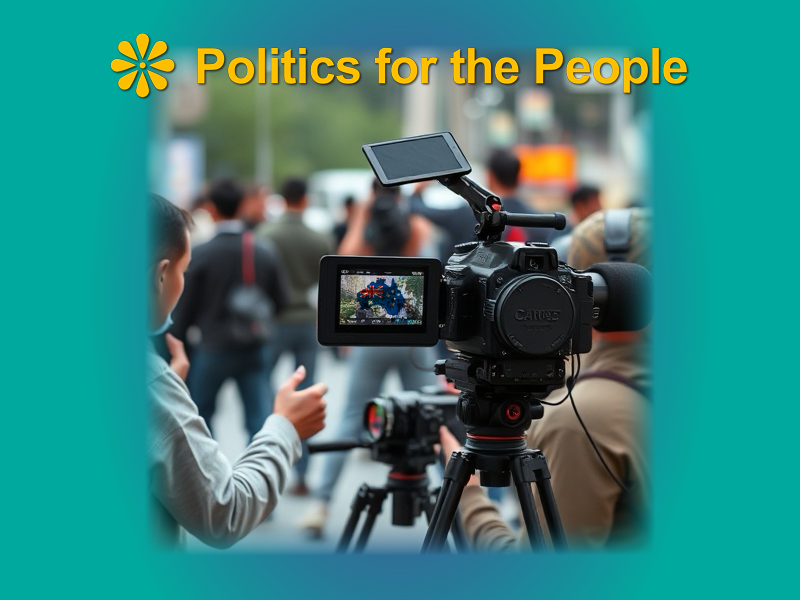Introduction: Weaponization of fear.
Fear, a primal emotion, wields significant power over human behaviour, capable of prompting drastic actions or causing complete inaction. In Australia, as elsewhere, fear has become a strategic tool used by politicians and corporations to influence and manipulate the public. This exploration offers a comprehensive look at the mechanisms through which fear is employed in shaping societal norms and behaviours, examining the impact on political discourse, corporate marketing, and media reporting.
The Politics of Fear
Immigration and Border Control

In recent years, Australian politics has seen a pronounced use of the weaponization of fear. in the realm of immigration and border control. Politicians often frame immigrants and asylum seekers as potential threats to societal safety and economic stability, arguing that stringent border control measures and detention centres are necessary to protect the nation. This tactic is designed to rally public support for policies that restrict immigration, using fear to override any concerns about human rights or the moral implications of such policies.
Terrorism and National Security
The global threat of terrorism has provided Australian politicians with a pretext to implement extensive surveillance and security measures. While national security is a legitimate and critical government function, the opaque nature of these policies often leads to concerns over their scope and the potential infringement on civil liberties. The weaponization of fear of terrorism is used to justify broad powers that may go beyond what is necessary, with little transparency or public accountability.
Corporate Fearmongering
Health Scares and Consumerism
Corporate entities have long exploited health-related fears as a powerful tool to drive consumer behaviour and boost profits. This strategy hinges on amplifying the perceived severity of health risks or lifestyle challenges, creating a sense of urgency and vulnerability among consumers. By framing their products or services as indispensable solutions, companies can manipulate decision-making processes, often leading people to buy items they do not genuinely need or that do not deliver on their promises.
Weaponization of fear is particularly clear in industries like dietary supplements, where aggressive marketing emphasizes deficiencies or potential health risks, suggesting that without these products, individuals may face grave consequences. Claims such as “boosts immunity,” “prevents aging,” or “supports heart health” are often overstated, preying on consumers’ desire to safeguard their well-being. Many of these supplements lack robust scientific backing, leaving buyers with false assurances while companies reap financial benefits.
Similarly, insurance policies employ weaponization of fear, highlighting scenarios of unexpected accidents, illnesses, or financial burdens. While insurance serves an essential purpose, some companies use high-pressure tactics to oversell policies or coverage, often pushing consumers to over-insure or purchase add-ons that are unlikely to help them.
The pharmaceutical and medical industries also exemplify fear-based consumerism. Direct-to-consumer advertising for medications often medicalizes ordinary experiences, presenting normal variations of health or aging as conditions requiring intervention. For instance, campaigns targeting conditions like low energy, mild anxiety, or hormonal imbalances often inflate the severity of symptoms, urging consumers to seek treatments that may not be necessary or right.
Another area where corporate fearmongering thrives is the fitness and wellness industry. Gyms, fitness apps, and equipment manufacturers capitalize on fears of obesity, aging, and chronic diseases by suggesting that their specific products or programs are the only effective paths to health. This can result in unsustainable consumer spending on memberships, devices, or fad diets that provide limited or temporary results.
Moreover, weaponization of fear disproportionately affect vulnerable populations, including those with limited health literacy or financial insecurity. For example, older adults may be targeted with products claiming to prevent memory loss or increase mobility, while parents are sold “must-have” items to ensure their children’s development. Fearmongering tactics can exploit their anxieties, encouraging them to prioritize perceived health needs over other critical expenses.
Corporate fearmongering is not limited to products but extends to systemic issues. Marketing campaigns often obscure the root causes of health crises, such as environmental factors or socio-economic disparities, redirecting attention to individual responsibility. This shift diverts pressure from corporations contributing to these problems—such as food companies promoting processed or sugary items—while placing the burden of health solely on consumers.
Addressing these issues requires greater regulation of marketing practices to ensure transparency and evidence-based claims. Stricter oversight by regulatory bodies like the Therapeutic Goods Administration (TGA) in Australia or the Food and Drug Administration (FDA) in the U.S. can help curb misleading advertising. Additionally, public health campaigns that empower consumers with critical thinking skills and health literacy can counteract the manipulative tactics employed by corporations, enabling individuals to make informed decisions based on their actual needs rather than fear.
While corporate fearmongering may be effective in driving short-term sales, it erodes trust and worsens societal inequities. Promoting ethical marketing practices and prioritizing consumer education are essential steps in fostering a marketplace that values integrity and genuine well-being over profit-driven exploitation.
Cybersecurity Threats
With the increasing prevalence of digital technology in every aspect of life, cybersecurity has become a major public concern. Companies in the digital security industry use this fear to their advantage by highlighting the potential risks of data breaches and identity theft. They present their security products and services as the only reliable safeguard against these threats, often exaggerating the likelihood or potential damage of such events to boost sales.
The Media’s Role in Amplifying Fear
Sensationalism and Public Perception
The media plays a critical role in shaping public belief by choosing how and what to report. Sensationalism in media coverage often amplifies the fears stoked by political and corporate narratives. Alarmist news stories and sensational headlines capture attention but can distort reality, making the public more anxious and more receptive to the solutions proposed by authorities or advertisers. This cycle of fear can skew public discourse and influence policy and consumer decisions based disproportionately on fear rather than informed judgment.
The Way Forward
Building Awareness and Advocating Transparency
To counteract the manipulation of fear, it is essential for the public to become aware of these tactics and approach media consumption and political rhetoric with a critical eye. By understanding the strategies used to exploit fear, Australians can resist manipulation and make decisions based on a balanced assessment of information. Advocating for transparency in both governmental and corporate sectors is crucial for ensuring that decisions affecting the public good are made openly and with genuine accountability.
Conclusion
The weaponization of fear is still a potent force within Australian society, influencing everything from political elections to consumer behaviour. By dissecting and discussing these mechanisms, the public can better understand the motivations behind certain policies and marketing strategies and push for a societal approach that values facts over fear.
Question for Readers
What are your thoughts on the impact of fear-based tactics in Australian society? How can individuals and communities work together to promote a more informed and less fearful public discourse?
Call to Action
Think critically about the information you consume and discuss these issues with your peers. Share this article with your contacts and on social media to foster a wider understanding of how fear is weaponized in our society. Let’s encourage a culture of informed scepticism and demand higher standards of transparency and truth.
References:
- Scare campaigns: Why fear is king in Australian politics: https://www.sbs.com.au/news/the-feed/article/scare-campaigns-why-fear-is-king-in-australian-politics/ajae45uwt
- Disinformation tactics: https://www.aec.gov.au/media/disinformation-tactics.htm
- Manipulation and the politics of fear: https://www.abc.net.au/news/2014-08-14/green-manipulation-and-the-politics-of-fear/5669614
- Fear and loathing in modern politics: https://www.uow.edu.au/the-stand/2016/fear-and-loathing-in-modern-politics.php
- Australia: Identity, Fear and Governance in the 21st Century: https://press.anu.edu.au/publications/australia-identity-fear-and-governance-21st-century

